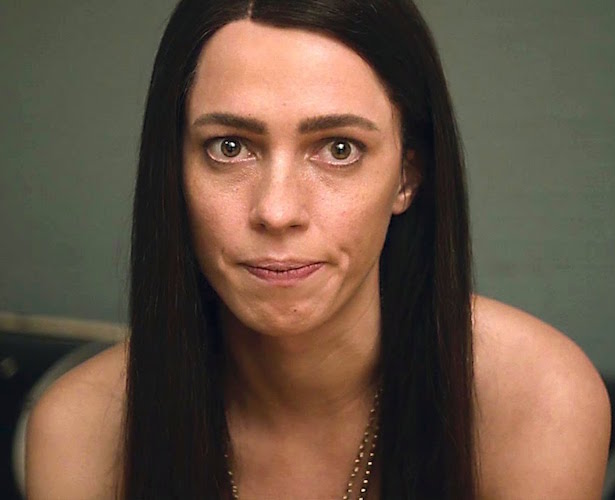Film Review: “Christine” — Dramatizing an On-Air Suicide
Christine is less interested in serving up a moral lesson or providing sociological analysis than generating sympathy.
Christine, directed by Antonio Campos. Screening at the Kendall Square Cinema, Cambridge, MA

Rebecca Hall as Christine in “Christine.”
By Tim Jackson
We already know the story: in 1974, Christine Chubbuck, an aspiring TV newscaster in Sarasota, Florida, took her life while on the air. The explanation given was that she was suffering from depression. Antonio Campos’ film takes a dark look at what made an idealistic journalist end her life in such an extreme and public way. It’s a narrative that, at least on the surface, speaks to the ambitions of professional women as well as the skewed priorities of broadcast news, to the point of touching on how, for some, media has come to serve as a means of existential affirmation. (Allegedly, Paddy Chayefsky’s classic script for Network was inspired by this incident.) In addition, at the Brattle Theatre in Cambridge on November 4, there will be the area premiere of Robert Greene’s Kate Plays Christine, which comes up with an interesting twist on the story. The film follows actress Kate Lyn Sheil as she prepares to play the role of Christine Chubbuck. She slowly becomes obsessed with the part.
Campos’ film, from a script by Craig Shilowich, is less interested in serving up a moral lesson or providing sociological analysis than generating sympathy. Like Afterschool (2008) and Simon Killer (2012) the director is fascinated by extremes of behavior. Rebecca Hall gives us a Christine of vacillating temperament: brilliant and ambitious alternates with the reactions of a wounded child. As a professional, Christine wants better stories and more on-air time. She fancies herself a ‘real’ journalist, which puts her at odds with Michael, her boss, who demands sensationalist news stories. The station’s ratings are low and he knows the kind of stories that will bring in lots of viewers. That issue becomes the windmill at which Christine tilts her sword, hoping against hope that her reportorial integrity will be rewarded. As Michael, Tracy Letts embodies the weary frustration of a man whose patience is sorely tested by Christine’s earnestness. As he did earlier this year (as Dean Caudwell in the film Indignation), Letts plays a beset authority figure with a dollop of good humor.
That humor leavens a sadness that runs throughout Christine. Christine’s hapless efforts to be assigned meaningful, socially relevant stories, to be given more airtime, to be promoted (even noticed) by Bob Anderson, the corporate owner of the chain of TV stations, are painful to watch. Late one night, irritated by the man’s indifference, Christine appears at Anderson’s doorstep, pretending that her car has had a flat tire. She goes on and on about her ideas, but Bob, who is a bit tipsy, keeps changing the subject. As Bob, John Cullum (Northern Exposure, Mad Men) is brilliant. The scene is realistic, yet its devastation takes on an aura of the ‘theatre of the absurd.’
In another instance, Christine accepts a date with a glamorous but dull newscaster (Michael C. Hall). Sensing her unhappiness, he brings her to an ‘interpersonal therapy meeting.’ Her co-worker means well, but Christine’s troubles are far too deep to be dealt with by way of a conversation with someone she’s just met. She is not quite a fully developed adult — uncertain and fragile, the film’s Christine is a grim caricature of ‘failure to launch.’ “I’m your child” she screams, demanding more attention from her mother (played by a wonderfully long-suffering J. Smith-Cameron). When dealing with kids, Christine comically regresses. She volunteers at a children’s center, performing to a room of youngsters; she ends up confronting her own issues through the voices of the puppets. Throughout the film, a soundtrack of ironically resonate pop songs from the 1970’s lighten the proceedings. But when Christine buys a gun, her last memorable public performance ends the flickers of farce.
Hall’s Christine is great fun to watch, flipping back her long, intrusive mane of brown hair as she lurches about the TV studio. The actress leaps from aggressive to passive, from deflated to elated, with surefooted ease. I’m not sure it is a psychologically nuanced characterization, but Hall gives us a sympathetic portrait of a troubled life. Caught between childhood and adulthood, Christine implodes. Given the somewhat narrow parameters of the film, she will not be a martyr to anything but her troubled psyche. Still, her desperation for personal and public affirmation, her hysterical dream that her job would give her life meaning, strikes a disarmingly common chord.
Tim Jackson was an assistant professor of Digital Film and Video for 20 years. His music career in Boston began in the 1970s and includes some 20 groups, recordings, national and international tours, and contributions to film soundtracks. He studied theater and English as an undergraduate, and has also has worked helter skelter as an actor and member of SAG and AFTRA since the 1980s. He has directed three feature documentaries: Chaos and Order: Making American Theater about the American Repertory Theater; Radical Jesters, which profiles the practices of 11 interventionist artists and agit-prop performance groups; When Things Go Wrong: The Robin Lane Story, and the short film The American Gurner. He is a member of the Boston Society of Film Critics. You can read more of his work on his blog.
Tagged: Antonio Campos, broadcasting, Christine, Christine Chubbuck, Rebecca Hall
